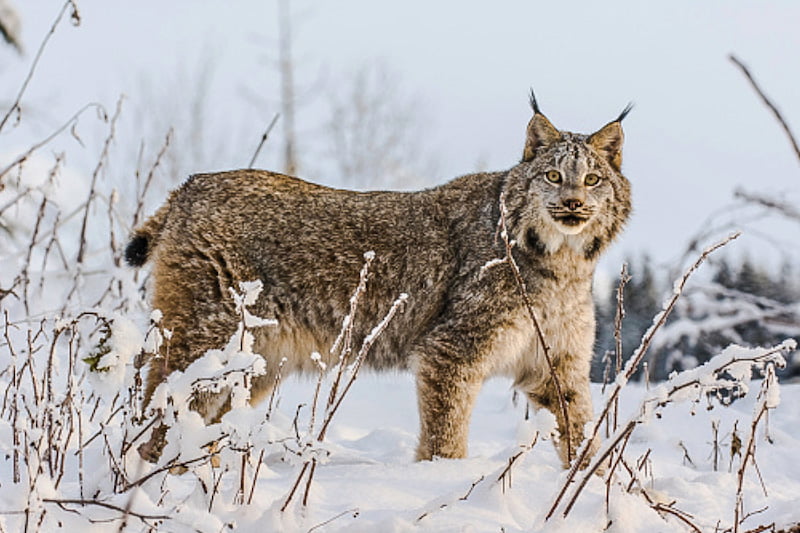The answer to the question depends upon the species of feline that you are referring to and the circumstances under which they are living. There is no simple black-and-white answer to the question. For example, the domestic cat tends to be nocturnal or a better description is crepuscular which means active at dawn and dusk when prey is about.
 |
| Tiger at night. This is not real because there are no white tigers in the wild. Photo: Pixabay. |
But domestic cats are also active during the daytime sometimes. They just tend to be more active when daylight is subdued or it is dark. But the domestic cat is only one species of about 36 (the number of cat species is still contentious). I'm not going to go through every single wild cat species to tell you whether they are nocturnal or not but I'll mention one or two to give you an idea about what I'm talking about.
The American bobcat is distributed across America except for a 'hole' in the middle of it near the Great Lakes so it is a very well known wild cat. Bobcats are primarily crepuscular like the domestic cat. They are most active in the few hours before and after sunset and sunrise. There are exceptions
Some studies have found that bobcats are mainly nocturnal while other reports have found that they may be active at any time of the day or that they are arrhythmic (without any pattern or rhythm). In some places bobcats are more active during the daytime in winter because they must spend more time searching for food. In essence it would seem that a bobcat's activity coincides with the activity of the animals that it hunts. That makes sense. As I said the answer to the question the title has to be nuanced.
 |
| Canada lynx. Photo: Pixabay. |
Taking another well-known medium-sized wild cat species living in North America, the Canada lynx, this cat is primarily nocturnal although they may be seen moving about at any time of the day. The animals that they mainly prey upon, snowshoe hares, are basically nocturnal which is why the Canada lynx is also mainly nocturnal. Once again you can see that the activity of the cat is dependent upon the activity of the prey.
The ocelot is a very well known small to medium-sized wildcat. Its coat has made the coats of many rich and famous people in the past. They are primarily nocturnal but they also hunt during the daytime especially when the weather is cloudy and rainy. They may be entirely nocturnal in areas where they are hunted by people. That sentence would apply to the past in America because as far as I'm aware they are no longer hunted by people because they are protected in North America if they are still extant on that continent.
The mountain lion lives in both North America and South America. They have a huge range in terms of distribution. These cats can be found hunting at any time of the day or night. In most areas the peak activity is reported to be around dawn and dusk i.e. crepuscular. They rest during the middle of the day. Once again their activity levels coincide with that of their major prey animals. Therefore it is seasonal and it depends upon where they live. For example, in the Idaho Primitive Area they are active during daytime to hunt ground squirrels. Where humans are more active such as where they are logging timber, mountain lions avoid them by being more active at night.
The concept of wild cats being more active at night to avoid people is also apparent with leopards. And you will find that lions also behave like this when necessary. They tend to avoid people by becoming nocturnal. Lions are apparently primarily nocturnal but there are no hard and fast rules as mentioned. It depends on the availability of prey animals to kill to eat and the type of habitat where they live which provides cover when stalking. Activity levels also depend upon the seasons and temperatures. And lastly it depends upon whether they are disturbed by people.
There have been reports of lions becoming nocturnal to avoid trophy hunters killing them. In the Serengeti there are two major peaks of activity, one of which is just after dark and the other between two and four in the morning.
Lastly, as I'm just giving you an idea as to whether cats are nocturnal or not, I will mention the tiger. Once again, in response to the activity of people, in certain parts of the world they have become totally nocturnal. If they are undisturbed by people they can be seen to hunt at any time of the day or night. Once again, also, their activity levels depend upon the activity of their prey animals. In other words it mirrors the activity patterns of the animals that they kill to eat. For example, in Chitwan National Park both male and female tigers mainly travelled at night for about 10 to 12 hours.
If you want to read more about the wild cat species and whether they are nocturnal or not then I would suggest that you search for those details on the main website which you can access by clicking here.

No comments:
Post a Comment
Your comments are always welcome.
Note: only a member of this blog may post a comment.